Mastering Hard Floor Cleaning in Home Cleaning
Introduction to Hard Floor Cleaning
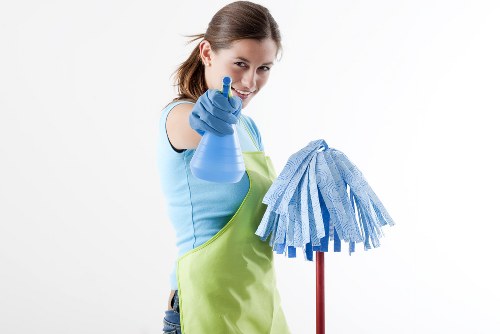
Hard floors are a staple in many households, offering durability and aesthetic appeal. However, maintaining their pristine condition requires regular and effective cleaning methods. Understanding the intricacies of hard floor cleaning ensures longevity and enhances the overall look of your home.
From hardwood and tile to laminate and vinyl, each floor type demands specific care techniques. This article delves into comprehensive strategies for cleaning various hard floor surfaces, ensuring your home remains both beautiful and hygienic.
Emphasizing the importance of proper home cleaning practices, we explore the best tools, products, and methods to tackle stubborn stains, scuffs, and everyday dirt. Whether you're a cleaning novice or a seasoned pro, these tips will elevate your hard floor maintenance routine.
Understanding Different Types of Hard Floors
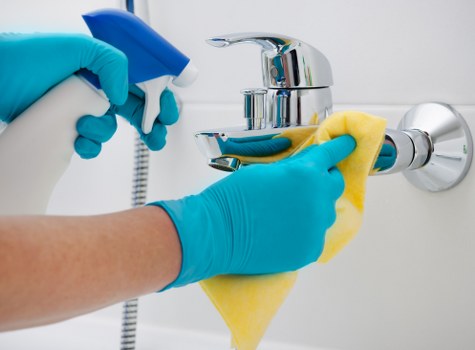
Hardwood Floors
Hardwood floors are cherished for their natural beauty and warmth. They require delicate care to prevent scratches, moisture damage, and fading. Regular cleaning not only preserves their appearance but also extends their lifespan.
Tile Floors
Tile floors, including ceramic and porcelain, are known for their resilience and ease of maintenance. They are ideal for high-traffic areas like kitchens and bathrooms. Proper cleaning methods ensure they remain spotless and free from grout buildup.
Laminate and Vinyl Floors
Laminate and vinyl floors offer versatility and affordability. They mimic the look of natural materials while being easier to maintain. Regular sweeping and occasional mopping keep them looking new and prevent damage from spills and scratches.
Essential Tools and Products for Effective Cleaning
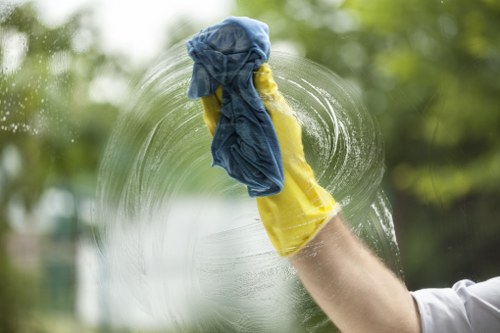
Cleaning Tools
- Broom and Dust Mop: Ideal for daily sweeping to remove loose dirt and debris.
- Mop: Essential for deeper cleaning; consider microfiber mops for better efficiency.
- Vacuum Cleaner: Use a vacuum with hard floor settings to eliminate dust and particulates.
- Scrubbing Pads: Useful for tackling stubborn stains and grout lines.
Cleaning Products
- pH-Neutral Cleaners: Suitable for most hard floors, preventing damage from harsh chemicals.
- Vinegar Solutions: A natural alternative for disinfecting and cutting through grime.
- Specialized Floor Cleaners: Designed for specific floor types, ensuring optimal results without harming surfaces.
- Protective Sealants: Apply to hardwood floors to guard against moisture and wear.
Additional Accessories
- Soft Cloths: For wiping up spills and polishing surfaces.
- Glue Scrapers: Remove sticky residues without scratching the floor.
- Steam Cleaners: Provide deep cleaning without the need for chemicals.
Step-by-Step Hard Floor Cleaning Guide
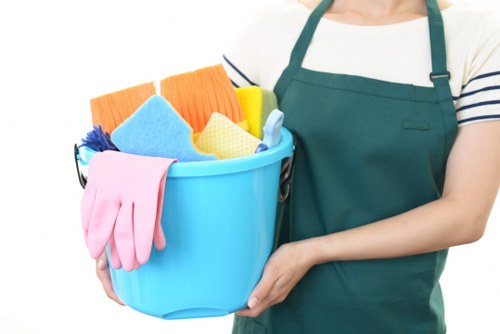
Preparation
Before diving into the cleaning process, it's crucial to prepare your space. Remove all furniture and rugs to ensure unobstructed access to the floor surface. Sweep or vacuum to eliminate loose dirt and debris, preventing scratches during the mopping phase.
Mopping Techniques
Choose a suitable mop based on your floor type. For hardwood, a damp (not wet) mop with a microfiber head is ideal. For tile and laminate, a slightly wetter mop can be used. Move systematically to cover the entire area, ensuring even cleaning without missing spots.
Stain and Spill Management
Address spills immediately to prevent staining and damage. Use a soft cloth to blot the area, avoiding vigorous rubbing that can spread the stain. For stubborn spots, apply a targeted cleaner and gently scrub until the mark disappears.
Deep Cleaning and Maintenance Tips
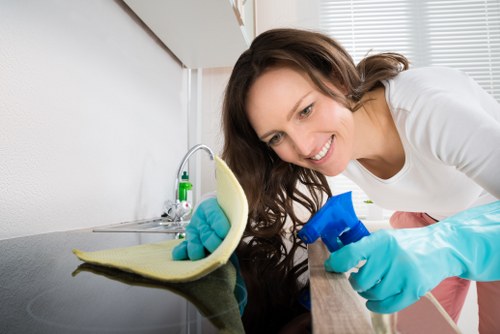
Regular Maintenance
Consistent care is key to maintaining hard floors. Implement weekly sweeping and monthly mopping routines to keep surfaces clean and free from buildup. Regular maintenance prevents the accumulation of grime and the need for intensive cleaning sessions.
Deep Cleaning Sessions
Schedule deep cleaning periodically to address areas that require more attention. Use specialized tools and cleaners to remove ingrained dirt, polish surfaces, and restore the floor's natural shine.
Preventative Measures
Protect your hard floors by using doormats at entryways to reduce dirt ingress. Place felt pads under furniture legs to prevent scratches when moving items. Additionally, control indoor humidity levels to protect hardwood from warping and cracking.
Seasonal Cleaning Routines
Adjust your cleaning schedule with the changing seasons. During wetter months, pay extra attention to vacuuming and mopping to combat increased dirt and moisture. In drier periods, focus on dusting and polishing to maintain shine.
Choosing the Right Cleaning Schedule
Establish a cleaning routine that fits your lifestyle and home usage. High-traffic areas may require more frequent attention, while less used spaces can be cleaned less often. Tailoring your schedule ensures efficient maintenance without overexertion.
Common Mistakes to Avoid

Using Excess Water
Applying too much water during mopping can damage hard floors, especially hardwood. Ensure your mop is damp rather than soaking wet to prevent moisture from seeping into seams and causing warping or staining.
Harsh Cleaners
Avoid using abrasive or acidic cleaners that can strip the floor's finish and cause discoloration. Opt for pH-neutral or floor-specific cleaners that maintain the integrity of the surface.
Neglecting Regular Maintenance
Skipping regular cleaning sessions leads to the buildup of dirt and grime, making deep cleaning more challenging. Consistent maintenance is essential for preserving the appearance and longevity of your hard floors.
Improper Drying
Allow floors to dry completely after mopping to prevent slips and water damage. Use clean, dry cloths or allow adequate ventilation to speed up the drying process.
Ignoring Manufacturer Instructions
Always follow the manufacturer's guidelines for cleaning and maintenance. Different floor types may have specific requirements that, if ignored, can lead to permanent damage.
Eco-Friendly Cleaning Solutions

Natural Cleaners
Incorporate environmentally friendly cleaning agents like vinegar, baking soda, and lemon juice. These natural solutions effectively clean without introducing harmful chemicals into your home.
Reusable Cleaning Tools
Opt for reusable microfiber cloths and mops to reduce waste. These tools are not only sustainable but also highly effective in trapping dirt and bacteria.
DIY Floor Cleaners
Create your own cleaning solutions by mixing ingredients like water, vinegar, and essential oils. DIY cleaners are cost-effective and customizable to suit your specific cleaning needs.
Benefits of Eco-Friendly Cleaning
Choosing eco-friendly methods reduces your environmental footprint and promotes a healthier living space. These practices are safe for children and pets, ensuring a clean home without compromising on health.
Implementing Green Cleaning Practices
Start by gradually replacing conventional cleaners with natural alternatives. Educate your household about the benefits and encourage consistent use to make a lasting positive impact on both your home and the environment.
Advanced Cleaning Techniques

Steam Cleaning
Steam cleaners offer a deep cleaning option without the need for harsh chemicals. The high-temperature steam effectively sanitizes surfaces, removes grime, and rejuvenates hard floors.
Polishing and Refinishing
For hardwood floors, periodic polishing and refinishing restore their natural luster and protect against future damage. Use appropriate products and follow proper techniques to achieve the best results.
Using Floor Protectors
Apply protective treatments like wax or sealants to hard floors. These finishes create a barrier against spills, stains, and wear, making future cleaning easier and enhancing the floor's appearance.
Machine-Assisted Cleaning
Invest in advanced cleaning machines such as automatic scrubbers and rotary cleaners. These tools increase efficiency, especially for larger areas, ensuring thorough and consistent cleaning.
Professional Cleaning Services
Consider hiring professional cleaning services for intensive maintenance tasks. Expert cleaners have the knowledge and equipment to handle complex cleaning challenges, delivering superior results.
DIY vs. Professional Cleaning

Advantages of DIY Cleaning
Cleaning your hard floors yourself can be cost-effective and flexible. You can tailor your cleaning routine to fit your schedule and preferences, ensuring regular maintenance without additional expenses.
Benefits of Professional Cleaning
Professional cleaners offer expertise and advanced equipment that can achieve deeper and more consistent results. They save you time and effort, handling intricate tasks that may be challenging to perform on your own.
When to Choose Professional Services
Opt for professional cleaning when dealing with heavily soiled floors, after major events, or when you need specialized treatments like refinishing or deep stain removal. Professionals can also provide regular maintenance packages for ongoing care.
Combining Both Approaches
A balanced approach involves regular DIY cleaning complemented by periodic professional services. This combination ensures your hard floors remain in excellent condition, benefiting from consistent upkeep and expert maintenance.
Cost Considerations
Evaluate the costs associated with DIY cleaning supplies and equipment versus the fees for professional services. Assess your budget to determine the most feasible and effective cleaning strategy for your home.
Maximizing Cleaning Efficiency
Regardless of the approach, focus on efficiency by organizing your cleaning process, using the right tools, and adopting best practices. Efficient cleaning routines save time and deliver better results, maintaining your hard floors’ beauty effortlessly.
Maintaining Clean Hard Floors Long-Term

Regular Cleaning Schedule
Establish a consistent cleaning schedule that addresses daily, weekly, and monthly tasks. Regularity prevents dirt accumulation and keeps your floors looking fresh and well-maintained year-round.
Spot Cleaning Practices
Address spots and spills immediately to prevent stains and damage. Keep essential spot cleaning supplies handy for quick response, ensuring minor issues don’t escalate into major problems.
Protective Measures
Implement protective measures like using floor mats, area rugs, and furniture pads. These additions reduce wear and tear, preserving the integrity of your hard floors.
Monitoring Floor Condition
Regularly inspect your floors for signs of wear, scratches, or other damage. Early detection allows for timely repairs, preventing minor issues from developing into costly replacements.
Adjusting Cleaning Techniques
As your hard floors age, adapt your cleaning techniques to suit their condition. Use gentler products or switch to different cleaning tools to maintain their appearance without causing further wear.
Conclusion

Effective hard floor cleaning is integral to maintaining a beautiful and healthy home environment. By understanding the unique requirements of different floor types and employing the right tools and techniques, you can ensure your floors remain spotless and durable for years to come.
Balancing DIY efforts with professional services, adopting eco-friendly practices, and adhering to a consistent maintenance schedule are key to achieving optimal results. Embrace these strategies to enhance the longevity and aesthetic appeal of your hard floors.
Don’t let the challenges of hard floor cleaning overwhelm you. Implement the tips and methods outlined in this guide to master the art of maintaining sparkling clean and well-maintained floors in your home.
Contact us today to learn more about our specialized home cleaning services and keep your hard floors in top condition effortlessly.